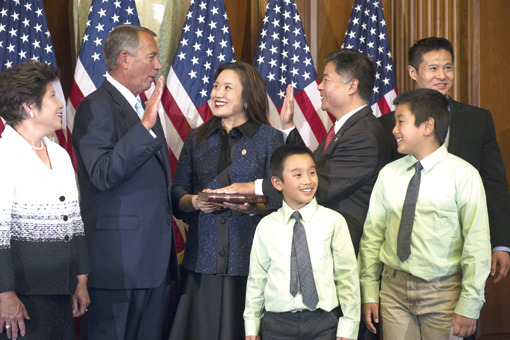- California Assembly OKs highest minimum wage in nation
- S. Korea unveils first graphic cigarette warnings
- US joins with South Korea, Japan in bid to deter North Korea
- LPGA golfer Chun In-gee finally back in action
- S. Korea won’t be top seed in final World Cup qualification round
- US men’s soccer misses 2nd straight Olympics
- US back on track in qualifying with 4-0 win over Guatemala
- High-intensity workout injuries spawn cottage industry
- CDC expands range of Zika mosquitoes into parts of Northeast
- Who knew? ‘The Walking Dead’ is helping families connect
[LA Times] Recent election gains show Asian American voters’ power surge
House Speaker John Boehner of Ohio administers a ceremonial re-enactment of the House oath-of-office to Rep. Ted Lieu D-Calif., accompanied by his wife Betty Lieu and family, Tuesday, Jan. 6, 2015, on Capitol Hill in Washington. (AP Photo/Cliff Owen)
From his new perch in Washington, Ted Lieu has suffered through an East Coast winter and other confounding indignities of life as a freshman member of the House from the party out of power. No matter, he says; he learned from his predecessor, the 40-year member Henry Waxman, that influence will be marked in years and decades, not the three months Lieu has spent in the capital.
For one of Lieu’s bases of support, however, a far swifter assertion of power is underway. The Torrance Democrat’s victory in November’s election was only one sign of the surge in importance of Asian American voters and Asian American politicians.
On the same night Lieu won Waxman’s seat, John Chiang claimed the job of state treasurer after two terms as controller. Betty Yee, a member of the state Board of Equalization, took over as controller. Fiona Ma, a former member of the Assembly, won a seat on the tax board.
Two months later in Orange County, the Board of Supervisors became majority Asian American after a special election. In San Francisco, state Atty. Gen. Kamala Harris is mounting her campaign for a U.S. Senate seat that will be open in 2016. Harris, the daughter of an Indian mother and Jamaican father, would be the first woman of Asian heritage — and the first African American — to serve as a senator from California.
















